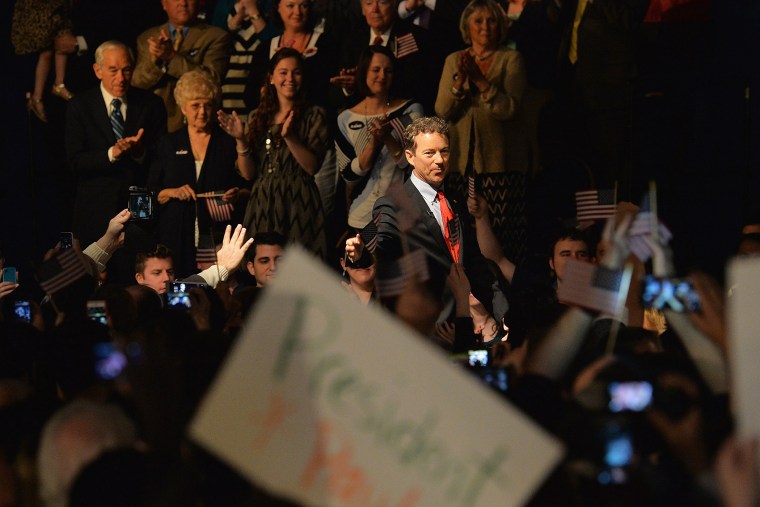On matters of race, the Rand Paul who announced his candidacy for the GOP presidential nomination this week was a far cry from the man who first gained national prominence in 2010.
Numerous commentators pointed out the fact that Paul's presidential aspirations were promoted by a number of black supporters, including former Congressman J.C. Watts and the Reverend Jerry Stephenson. The Kentucky senator not only name-checked Dr. Martin Luther King Jr. in his announcement speech, he also made a seemingly genuine pitch to all voters whether they're "white or black, rich or poor."
Paul made a direct appeal to impoverished inner city residents, promoting "economic freedom zones" in predominately black areas like Detroit. And he has since weighed in on the controversial police shooting death of Walter Scott, an apparently unarmed black man, calling it a "terrible tragedy" and demanding that "justice" prevail. Paul campaigned on Thursday in South Carolina, where Scott was killed last week.
"Sen. Paul believes our party should look like the rest of America and he was honored to share the stage with a student, pastor, community leader, and doctor," Eleanor May, a spokeswoman for his campaign, told msnbc. "Sen. Paul has made it a priority of his to reach out to diverse constituencies, with the hope of making the Republican party bigger, better and bolder."
But the inclusiveness on display during Paul's announcement soon grew complicated. Critics pointed out that Stephenson, the aforementioned pastor, said in 2010 in a video from a purported tea party rally, “the greatest slave owner we’ve ever had is in Washington D.C. and it’s time to stop him.” After introducing Sen. Paul on Tuesday, Stephenson reportedly told members the press “In five years we’ll find out what [Obama’s] real religion is.”
Paul's campaign has not commented publicly on Stephenson's remarks.
All this raises an important question: Can Paul be an effective voice for diversifying his party?
When he was first running for U.S. Senate in Kentucky back in 2010, his campaign was nearly derailed during an interview with msnbc's Rachel Maddow when he expressed ambivalence about the 1964 Civil Rights Act.
Ironically, black voters first began deserting the Republican party in droves when the party's 1964 standard bearer, Barry Goldwater, opposed the Civil Rights Act. Ever since taking office, Paul has made a concerted effort to court minority voters -- a strategy which culminated in Tuesday's distinctly diverse 2016 campaign rollout.
RELATED: 'Daddy issues' plague several 2016 GOPers
Still, it's understandable that many African-Americans might be skeptical about what Paul is selling. He and his father, former Rep. Ron Paul, have routinely had to distance themselves from white supremacist supporters and, in the case of the elder Paul, newsletters littered with racist invective written in his own name.
The elder Paul, whose libertarian ideology has undoubtedly influenced his son's, was once an unabashed critic of the 1964 Civil Rights Act, allegedly as a matter of libertarian principle. The younger Paul has since said he backs the historic law and has also taken up several causes that would, at the very least, intrigue voters in communities of color.
He has partnered with one of the only two African-Americans currently serving in the U.S. Senate, New Jersey's Cory Booker, to sponsor legislation to both significantly reform sentencing laws and to federalize the legalization of medical marijuana. Paul was also one of the few Republicans to visit Ferguson, Missouri, in the wake of racial unrest there last year. He has questioned the need for polarizing voter ID laws and he has gone out on a limb to call for voting rights for felons, a "third rail" political position few Democrats will even touch.
And yet, despite what may be the best of intentions, some of Paul's moves to find common ground have backfired badly -- including his highly publicized 2013 trip to the predominately black Howard University, where he managed to offend much of the student body with a condescending history lesson on race.
Paul's remarks were ridiculed by students who did not buy in to his suggestion that black voters should back the GOP because it was once the party of Abraham Lincoln and emancipation. And he damaged his argument further still by flubbing the name of the first black senator popularly elected in the post-Reconstruction era, the late Massachusetts Republican Edward Brooke.
Still, Paul won plaudits for daring to even appear at the school.
Writing for theGrio at the time, former RNC chairman Michael Steele conceded that "there was so much that was wrong about his approach to the students," but added, "Rand Paul does something very few Republicans, nationally or locally, ever do: engage."
RELATED: Matthews: 'I salute Rand Paul for having the guts'
Paul also lost ground that year when one of his staffers, jack Hunter, was revealed to be a self-proclaimed "Southern Avenger." Paul was forced to cut ties with Hunter after his praise for John Wilkes Booth and the Confederacy were exposed, along with statements that white people are “not afforded the same right to celebrate their own cultural identity” and that diversity is "nothing more than a code word for ‘not white.'"
Paul was also forced to fire his 2010 campaign spokesman, Christopher Hightower, for marking Martin Luther King Day by posting a message on social media which read “HAPPY NI**ER DAY!!!” next to a picture of a lynching.
Paul clearly still believes he can make a play for minority votes. Just last month he accused the Democratic Party of taking black voters "for granted," and without Barack Obama on the ballot some Republicans are optimistic about siphoning off enough minority support from the eventual 2016 Democratic nominee to increase their chances of winning a few swing states, and perhaps even the White House in 2016.
As the 2016 field continues to expand, Rand Paul will need to find fresh new ways to differentiate himself from his GOP rivals. His consistent willingness to "go there" on race, may be just the curveball his candidacy needs.
